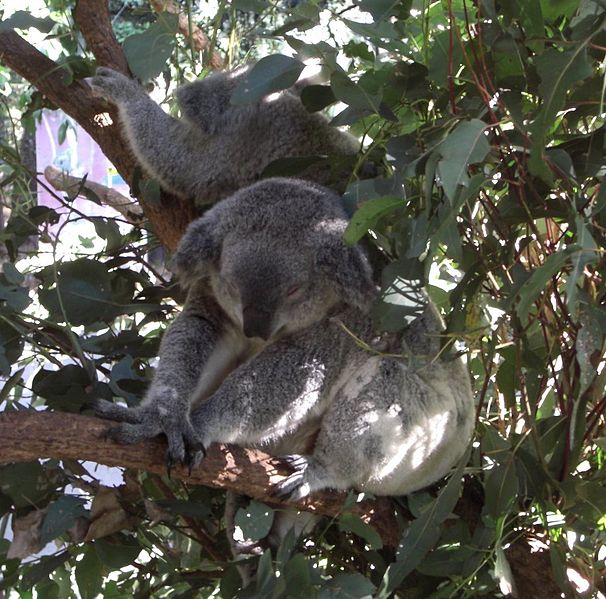Baird government to axe Native Vegetation Act

Koalas and other iconic wildlife are vanishing from our bushland as the trees they call home continue to be cleared for farmland. They’re plastered across our tourism brochures, yet government policies are putting them at risk.
The NSW Baird government is scrapping the Native Vegetation Act – one of the most important protections for koalas in our state. While the focus remains on native vegetation, a real and important issue is the wildlife, and ecological systems, that inherently belong to these habitats. It’s assumed they will just “move on” and re-home themselves conveniently elsewhere! The “elsewhere” is getting harder and harder to find.
The Native Vegetation Act 2003 (the Act) frames the way landholders manage native vegetation in NSW by preventing broadscale clearing unless it improves or maintains environmental outcomes.
Data collated by the Productivity Commission for their review of native vegetation regulation found that a decline in overall clearance did take place from the early 1980s to the early 2000s in all Australian states and territories (Productivity Commission 2004) However, of the 74,000 hectares of land cleared in New South Wales in 2005, 40 percent (ie 30,000ha) was cleared illegally (ie without prior approval; NSW AOG 2006).
In 2003, the NSW Government pledged $3.5m to establish a satellite monitoring system in the state (although some parties have claimed the receiving department did not end up using the money for this purpose; The Wilderness Society 2008).
A biodiversity report released last December contained 43 recommendations for significant change, including repealing the Native Vegetation Act and other legislation that had been plaguing farmer productivity for decades. It also recommended streamlining of development assessment where land use change can occur, which places farming development on an even playing field with other types of development. It’s commercial interests, of profit-increasing, over conservation and protection of biodiversity. Instead of a triple bottom-line, the bottom line will be profits, developments and economic progress!
Key to the proposal is the removal of the requirement that land clearing only be allowed if it improves or maintains environmental outcome, and shifting approval for vegetation clearing to the planning system. North East Forest Alliance (NEFA) spokesperson Dailan Pugh said most rural councils had yet to identify or map high-conservation value vegetation for protection and, where they had ,the National Party had intervened to stop it.
A host of environmental groups, including World Wildlife Fund and the National Parks Association, condemned the review of the state’s biodiversity legislation for neutering the office of environment and say it will lead to wide-scale land clearing and loss of species.
The review panel report that recommended this backward legislation also recommended conserving habitat at a regional or even state scale. Farmers, it said, had been left to carry an unfair share of responsibility for preserving nature in the state. “Regional or State” level is a way of leaving it up to individuals, who will probably be loaded with conflicts of interests! It’s political abandonment, to make way for housing and urban growth.
Of course the National Party and the farmers will welcome this news, and gives them more license for land clearing and short-term profits.
Mr Evans, chief executive of NSW National Parks Association, said the rate of land-clearing from agriculture had fallen 68 per cent since the Native Vegetation Act was passed in 2003. So, the Act was working!
The Wilderness Society NSW Campaign Manager Belinda Fairbrother said: “Weakening wildlife protection laws will place our threatened species in peril at a time when bold action is required to reverse the ongoing decline in our state’s rich biological diversity… We are resolutely opposed to any weakening of our state’s wildlife protection and land clearing laws”. Backward Australia will be more cleared at a time of multiple environmental and climate change threats, and will be a the cost of long term sustainability, and ultimately more food security threats.

“The Native Vegetation Act is among the most important nature conservation laws in NSW because it protects so much of the state’s wildlife like koalas and gliders from indiscriminate destruction. “If new laws weaken protections for land and wildlife, Mike Baird will be remembered as the Premier who took us back to the dark days of broadscale land clearing” said Nature Conservation Council CEO Kate Smolski.
(image: paddock containing remnant native vegetation:CSIRO )
Labor leader Luke Foley said native animals, birds and native bushland would be the losers after the Government said it would implement all 43 recommendations of a review of the state’s biodiversity legislation, completed last year.
Sydney’s urban sprawl had wiped out market gardens on peripheral land since first settlement. The problem now is Sydney’s expansion has reached the last phase, where in 20 to 50 years the sprawl will eradicate unprotected farms. So, instead of containing the limits of population growth, more land clearing will “fix” the problem, and mow down the constraints of trees, grasslands and bush in the path of “progress”.
Australia continues to have a net loss of biodiversity and the United Nations reports that we are entering an extinction crisis. What does this government and some farmers have against a healthy environment?
Contradictorily, at the same time as the government is establishing a $100 million survival fund to stop a ‘race to extinction’! The commitment was made after Opposition Leader Luke Foley promised $150 million to create new national parks including a Great Koala National Park on the north coast — as a nod to the NSW Labor Party’s preference allies the Greens. It’s easy to make political promises, throw out spin, and money to environmental problems, but actually have tight laws and policies protecting native vegetation and wildlife is far to holistic and intrinsic for slippery politicians who pander to lobby groups.
